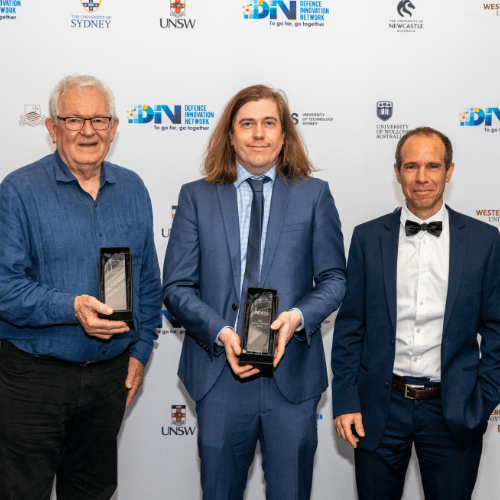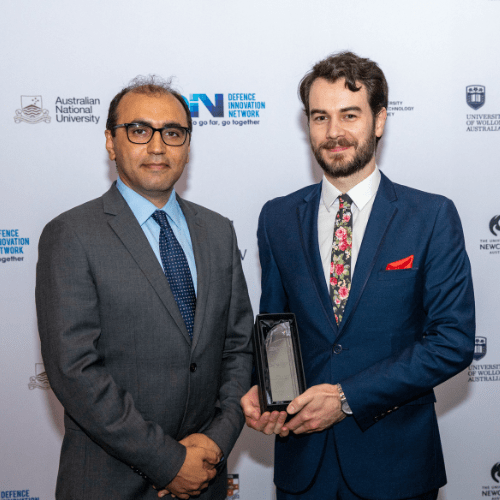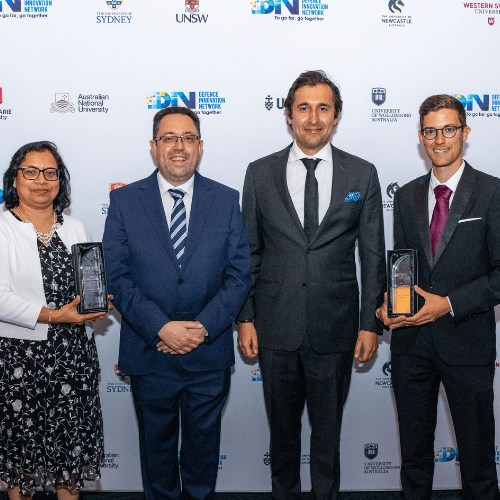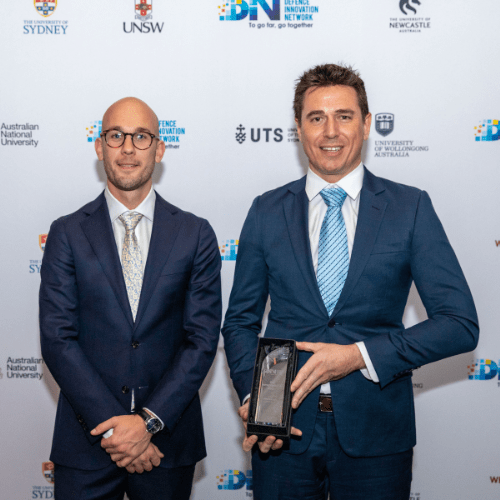DIN Impact Awards honour and celebrate the achievements of future-minded academics, Defence researchers and companies involved in DIN programs that have harnessed the power of collaboration to contribute to the Defence innovation ecosystem.
To mark the occasion, DIN hosted the first Awards Dinner in November 2022 to celebrate its fifth year in operation and the achievements of our partners over the last few years. We were thrilled to announce the winners in five categories.
Women in Defence Supernova - Siobhan Lyndon, AMSL Aero
Siobhan Lyndon is a co-founder of AMSL Aero, a company with the vision to build a fully electric VTOL aircraft that can support Defence efforts in remote and contested environments.
Siobhan has been instrumental in AMSL Aero’s strategy to partner with the academic sector and companies to develop critical aspects of the aircraft. This has seen the dramatic acceleration of the maturity of Vertiia, the company’s plane, from early small prototypes to the present full-scale prototype. In addition, she has overseen the core business competencies of the company, been focussed on growing the product profile and its status in the market, and drove the recent capital raise ($20M) of AMSL Aero.
Siobhan’s role in AMSL Aero is a shining exemplar of the defining role that Women in STEM and Women in Defence can play in developing and commercialising first technologies. Siobhan is a role model for girls and women in STEM and Defence.
Partner Paragon - Dr Alexander Thorpe, University of Newcastle
For his work on the Integrated Digital Helmet System project.
As a PhD student at the University of Newcastle, Dr Alexander Thorpe devised and tested methods for objective assessment of operators’ cognitive workload. The project aimed to establish the benefits of wearable technology that delivered information about the battlespace to the wearer, to improve the wearer’s situational awareness during engagements. Emphasis was placed on the cognitive effect of the information on the wearer, as the information needed to relieve the wearer of the cognitive burden of low situational awareness while not overloading their limited mental capacity.
He presented this work at several NSW DIN events and attracted the attention of multiple industry and defence delegates, which directly led to a collaboration with industry partner Spearpoint Solutions and Technology Pty Ltd. This collaboration culminated in a Defence-funded DIH, > $3M. Alex showed clear leadership in progressing the research and partnership with the industry partners. This successful collaboration with Spearpoint and the knowledge gained led to other defence-related projects around operators’ cognitive workload.
Innovation Genius- Prof Jim Rabeau, University of Sydney
The team led by Prof James Rabeau from CSIRO, A/Prof Omid Kavehei and Dr Thomas Boele from The University of Sydney addresses the challenge of integrating and miniaturising ultrasensitive room-temperature magnetic sensing devices, specifically for use in navigation where satellite-based navigation (GPS) is denied, developed a platform technology that achieves small size, weight, power and high sensitivity at the same time.
A magnetometer for room temperature is developed by exploiting nitrogen vacancy centres in diamonds. It provides true vector sensing capability on a single silicon chip at a high dynamic range and is designed as a fully integrated solution with semiconductors. Its multi-modal and array-type capabilities can be used for navigation in hostile environments, communication, medical imaging, and inertial measurements without requiring cryogenic refrigeration.
The chip itself, designed in partnership with an NSW-based semiconductor design company, takes what occupies typically a large part of a laboratory bench and integrates it on a chip less than an mm square. The solution is now one of only two existing on-chip quantum magnetometers worldwide and is the only fully integrated solution of its kind. This enables them to deliver sensory array solutions where the system’s sensitivity, size, weight, and power consumption will be well within the specifications for use in a wide range of portable applications.
Commercialisation Champion- UTS & DroneShield
Recent increases in the misuse of small drones are a rising threat due to their potential use for illegal activities. Hence, the ability to detect and track drones in real time has become a critical capability for the defence sector, other government agencies and commercial entities. DroneShield’s AI Vision Team collaborated with the UTS Intelligent Drone Lab research team and computer vision experts to advance the current state-of-the-art optical drone detection using AI and computer vision. The collaboration resulted in ‘DroneOptID’, a sensor-fusion-based cutting-edge counter-drone technology using the latest Deep Learning techniques to detect, identify and track drones up to a kilometre away with any PTZ cameras.
The customised Deep Learning model is trained with a continuously growing dataset of >300,000 drone images collected by DroneShield, representing an exhaustive range of drone models in different environments. A non-standard hybrid approach was used to achieve the system’s specific requirements, such as real-time performance and detection of small objects. The team experimented with the latest neural network architectures and used advanced optimisation techniques for real-time image processing while maintaining high-accuracy detection (above 85%) in an unconstrained environment.
DroneOptID received significant attention through media coverage and technology demonstrations in Australia and overseas while adding an innovative solution to the skyrocketing global counter-drone market. DroneOptID’s launch customer was DroneShield’s UK partner, British Telecom (BT), and has been deployed at several high-profile airports across Europe and led to several industry partnerships.
The resulting commercial product, ‘DroneOptID’ was purchased by Australia’s Defence Science and Technology Group in 2021 to support various R&D applications and generated over $1.4mil AUD in revenue.
5th Anniversary Superstar- Advanced Navigation
Advanced Navigation was founded in Sydney, Australia, in 2012 by engineers Xavier Orr and Chris Shaw to commercialize university research on AI-based inertial navigation. Since 2012, the company has experienced great success and has progressed into several deep and new technology fields. This includes underwater acoustics, GNSS antennas and receivers, radio frequency systems, inertial sensors, robotics, and quantum-enhanced inertial navigation.
Today, Advanced Navigation is a supplier to some of the biggest companies in the world, including Airbus, Boeing, Google, Apple, and General Motors. Advanced Navigation is headquartered in Sydney, Australia, with multiple research facilities throughout the country and sales offices around the world. The Company’s robotic and navigation solutions optimize performance and efficiency by leveraging AI neural networks and deep learning algorithms. Advanced Navigation sensor products are sold into commercial and defence industries spanning sea, land, air and space applications. The Company’s AI approach allows its solutions to have greater accuracy and reliability while maintaining a small form factor.
DIN supports Advanced Navigation through our PhD student internship program and high-level introductions to the US Military, leading to direct contracts and future collaborative project work with DIN member universities and various US military groups.













